Dr. Naresh Thadhani
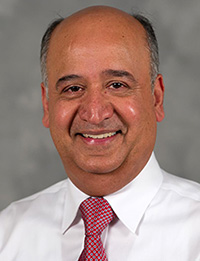
Naresh Thadhani is a Professor and past Chair of the School of Materials Science and Engineering (MSE) at Georgia Tech (GT). After serving as School Chair over two five-year terms from 2012-2022, he worked on a 12-month Jefferson Science Fellow assignment with the U.S. State Department Bureau of Overseas Building Operations providing materials subject matter expertise for the design, construction and maintenance of embassies and consulates addressing challenges of extreme and often competing environmental, security, geopolitical, and diplomatic considerations.
Professor Thadhani is recognized for his research on the fundamental mechanisms of shock-induced physical, chemical, and mechanical changes in materials, including their deformation and fracture behaviors under extreme conditions of high-velocity impact and high strain rate deformation. He has led the understanding of shock-induced phase transformations and mechanical properties in advanced steels, bulk metallic glasses and additively manufactured materials; design, development, and characterization of structural energetic materials; and interactions of shock waves with heterogeneities in composite (solid) and granular (powder) materials. He has built one-of-a-kind state-of-the-art high strain rate gas-gun and laser-driven impact experiments laboratory combining mesoscale spatial and nanosecond resolution temporal diagnostics, and mesoscale computational simulation capabilities.
Professor Thadhani’s recent projects include experimental investigations of pressure induced phase transformations on shock energy dissipation and their subsequent influence of spall failure in ferrous and non-ferrous alloys. He is also investigating the initiation and kinetics of chemical reactions in highly exothermic intermetallic forming mixtures driven by macro-scale shear and micro-scale instabilities introduced by local perturbations. His work on sustainable manufacturing includes hydrogen-based direct reduction of iron oxide to fabricate net-shaped Advanced Steels, with net-zero CO2 emissions and using lower-quality ores and tailings.
Professor Thadhani has advised 15 visiting scientists/post-docs; more than 30 Ph.D and 18 M.S degree students; and mentored 60+ undergraduate student researchers. He has attracted research funding from various federal agencies including the AFOSR, ARO, DARPA, DTRA, ONR, NNSA/SSAA, NSF, as well as the DoE and DoD national laboratories and industries. He has co-edited 12 books/proceedings, published more than 200 refereed journal papers (including several invited review articles), 173 papers in conference proceedings, and presented more than 170 invited talks and seminars. He has served (or is serving) on National Academies’ panel for review of the Army Research Laboratory, critical review of Materials programs at numerous Universities, External Advisory Boards of Materials departments at Clemson University and the University of Tennessee, Board of Directors of the Wire Association International, and as a consultant to several industries and the U.S. Department of State.
Professor Thadhani is recipient of the National Academies’ Jefferson Science Fellowship and the TMS Leadership award. He is an elected Fellow of ASM International and the American Physical Society, and Academician of the EuroMediterranean Academy of Arts and Sciences.
Research Scientist II

Dr. Greg Kennedy
Dr. Kennedy is our Research Scientist II and go-to-guy. He received his M.S. from Georgia Tech in Materials Science and Engineering, and his Ph.D. from Kumamoto University in New Frontier Sciences. He is an outdoorsman and avid bicyclist.
Graduate Students
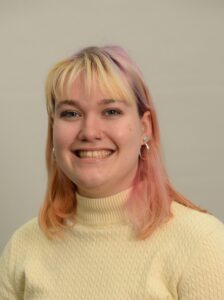
Jackson Smith
Jackson Smith is currently a First year Ph.D student in the Materials Science and Engineering School at Georgia Tech. Previously, she earned a B.S.E and M.S. in Materials Science and Engineering from Case Western Reserve University in 2024. Additionally, Jackson is an employee at NASA Kennedy Space Center as part of their Pathways co-op program. At NASA she works in the Applied Chemistry Laboratory and the Granular Mechanics and Regolith Operations Laboratory.
In Dr. Thadhani's group, Jackson works on understanding the complexities of shock disruptions caused by volume-changing phase transitions and wave interactions with impedance-matched/mismatched interfaces, and effects on impact-induced spall failure in Fe-Mn layered alloys. This project is in collaboration with the Army Research Lab and Army Research Office.
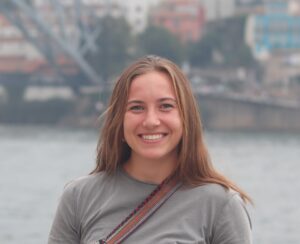
Georgia Hilburn
Georgia Hilburn is a first year Ph.D. student in the Materials Science and Engineering school at Georgia Tech. Georgia earned a B.S. in Mechanical Engineering and B.A. in Spanish at The University of Tulsa in 2024.
In Dr. Thadhani's Group, Georgia work centers around understanding the behavior of additively manufactured reactive materials, particularly layered nickel-aluminum foils. In conjunction with Sandia National Labs, she is working to characterize both the thermal ignition of this material using differential scanning calorimetry and its mechanical ignition behavior using shock-induced shear. This research has potential applications in both defense and energy storage.
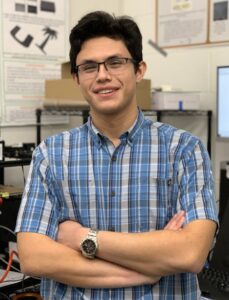
Neyton Baltodano
Neyton Baltodano is currently a First year Ph.D. student in the Mechanical Engineering School at Georgia Tech. Previously, he earned a B.S. in Aerospace Engineering from the University of Miami.
Neyton’s research focuses on increasing the density of Molybdenum parts produced by the reduction of extruded molybdenum oxide pastes. He is working on investigating the kinetics of sintering as well as the reduction reaction that is performed on the molybdenum oxide paste after it is extruded from a die. Some of the production process parameters he will be examining closely are the furnace schedules, furnace atmosphere composition, and the addition of other elements to act as sintering aids.
Neyton is co-advised by Josh Kacher and Naresh Thadhani.

Alec Balandin
Alec Balandin is a first year Ph.D. student in the Materials Science and Engineering school at Georgia Tech. Alec earned a B.S. in Nanoengineering at UC San Diego in 2024.
Alec’s research focuses on the extrusion kinetics and rheology involved in the green steel project. In the green steel project, net-shaped parts are formed by extruding oxide slurries, with the oxides comprising the targeted steel composition. This extruded material is then reduced and sintered in a hydrogen rich environment, resulting in a steel part. This study involves the use of mathematical modeling as well as electron microscopy characterization to achieve precise geometry on extruded materials.
Alec is Co-advised by Josh Kacher and Naresh Thadhani.
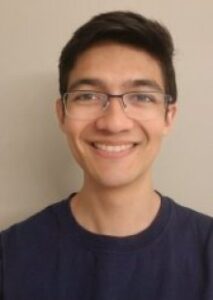
Tyler Knapp
Tyler Knapp is a 4th year Ph.D. student in Materials Science and Engineering at Georgia Tech. Tyler earned a B.S. in Materials Science and Engineering from Georgia Tech in 2020.
Tyler is co-advised by Aaron Stebner and Naresh Thadhani.
Undergraduate Students

Dhilan Nanji
Dhilan is a fourth-year undergraduate student in Materials Science and Engineering at Georgia Tech and the Chief Technology Officer of Measurment at the Materials Innovation and Learning Laboratory.
Dhilan assists with Georgia's research project.
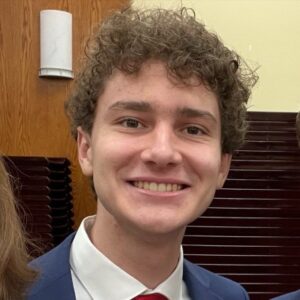
Mario Jimenez
Mario is a third-year undergraduate in Materials Science and Engineering at Georgia Tech.
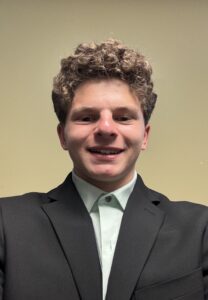
Alex Abraham
Alex is a first-year undergraduate student in Materials Science and Engineering at Georgia Tech. Alex is also a member of the Georgia Tech Solar Racing Team and a staff member at the Materials Innovation and Learning Laboratory.
Alex assists with Jackson's research project on impact induced spall failure in Fe-Mn layered alloys.

Zachary Lonker
Zach is a first-year undergraduate student in Materials Science and Engineering at Georgia Tech and a staff member at the Materials Innovation and Learning Laboratory.
Zach assists with Jackson's research project on impact induced spall failure in Fe-Mn layered alloys.
